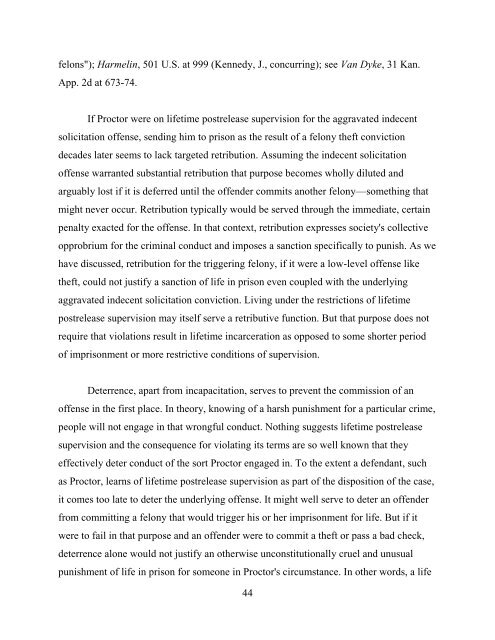State v. Proctor - Kansas Judicial Branch
State v. Proctor - Kansas Judicial Branch
State v. Proctor - Kansas Judicial Branch
Create successful ePaper yourself
Turn your PDF publications into a flip-book with our unique Google optimized e-Paper software.
felons"); Harmelin, 501 U.S. at 999 (Kennedy, J., concurring); see Van Dyke, 31 Kan.<br />
App. 2d at 673-74.<br />
If <strong>Proctor</strong> were on lifetime postrelease supervision for the aggravated indecent<br />
solicitation offense, sending him to prison as the result of a felony theft conviction<br />
decades later seems to lack targeted retribution. Assuming the indecent solicitation<br />
offense warranted substantial retribution that purpose becomes wholly diluted and<br />
arguably lost if it is deferred until the offender commits another felony—something that<br />
might never occur. Retribution typically would be served through the immediate, certain<br />
penalty exacted for the offense. In that context, retribution expresses society's collective<br />
opprobrium for the criminal conduct and imposes a sanction specifically to punish. As we<br />
have discussed, retribution for the triggering felony, if it were a low-level offense like<br />
theft, could not justify a sanction of life in prison even coupled with the underlying<br />
aggravated indecent solicitation conviction. Living under the restrictions of lifetime<br />
postrelease supervision may itself serve a retributive function. But that purpose does not<br />
require that violations result in lifetime incarceration as opposed to some shorter period<br />
of imprisonment or more restrictive conditions of supervision.<br />
Deterrence, apart from incapacitation, serves to prevent the commission of an<br />
offense in the first place. In theory, knowing of a harsh punishment for a particular crime,<br />
people will not engage in that wrongful conduct. Nothing suggests lifetime postrelease<br />
supervision and the consequence for violating its terms are so well known that they<br />
effectively deter conduct of the sort <strong>Proctor</strong> engaged in. To the extent a defendant, such<br />
as <strong>Proctor</strong>, learns of lifetime postrelease supervision as part of the disposition of the case,<br />
it comes too late to deter the underlying offense. It might well serve to deter an offender<br />
from committing a felony that would trigger his or her imprisonment for life. But if it<br />
were to fail in that purpose and an offender were to commit a theft or pass a bad check,<br />
deterrence alone would not justify an otherwise unconstitutionally cruel and unusual<br />
punishment of life in prison for someone in <strong>Proctor</strong>'s circumstance. In other words, a life<br />
44

















